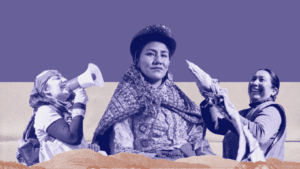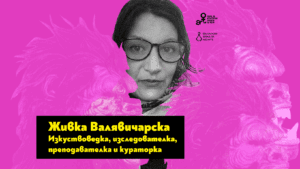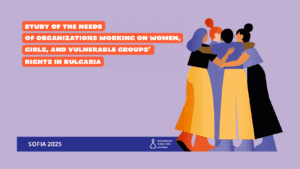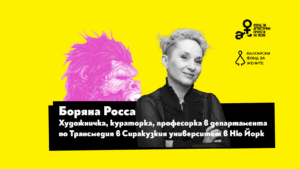And the year-long struggle of a small foundation to do away with the “civil death” that threatens more than 7,000 vulnerable Bulgarians
Eli Marinova, 27, is always eager to share how much she likes working in the garden – and how she likes assigning tasks to her co-workers when in charge. She is saving for a place of her own where she plans to move in the fall. Her favorite pastime is riding her bike, sometimes quite audaciously – she tells me about all her misadventures on the roads of Dobrich with glistening eyes and a devilish smile. Then she shares some of the dozens of photos on her phone that capture life in the sheltered house in Dobrich with an immediacy that could hardly leave one unmoved.
Eli probably wouldn’t not have left the foster home for children and youth in the village of Krushari and embarked on her own path without the intervention of Maria Metodieva, Executive Director of the “Nikolai Chudtoverets” Foundation, and the other members of the team, who have been advocating citizens stigmatized – not necessarily on sound medical grounds – as “mentally retarded” or ill and placed under legal guardianship.
“If you have never encountered this concept, it is difficult to grasp what “guardianship” even is. Namely, a form of civil death that doesn’t exist anywhere else in Europe”, says Maria. Based on the archaic Family Law adopted in the 1940s, citizens who have been placed under guardianship in Bulgaria are considered incapable of making binding decisions or holding property singlehandedly. In practice, this subjects them to constant dependence – on their families, care institutions, or even on professional guardians whose activities are not fully regulated by the state.
There have been only seven precedents of rescinded guardianship rulings – six of which are thanks to the Foundation alone. Maria told usthat in the beginning, not even her like-minded colleagues in the civil sector believed that such legal victories were possible. “The judge in the first case was not familiar enough with the UN Convention on the Rights of Persons with Disabilities [ratified by the Bulgarian Parliament back in 2012]”. She attributes these breakthroughs to her team’s long-term work with those affected and – with understated poignancy – to the strategic choice to target their initial efforts at individuals whose disabilities are “borderline” according to medical convention. Since disease – be it of the mind (“retardation”) or of the psyche (schizophrenia, psychosis) – is the purported justification for such restrictions, the team of the Foundation found itself forced to convince the court that it had “cured” those it cared for.
Though they don’t often get the spotlight, disability policies affect us all, whether directly or vicariously. No one is immune to falling under one of the medical categories that the state deems prerequisites for guardianship —such as dementia and Alzheimer’s disease. According to Maria, it is completely illogical that a citizen can posthumously transfer her property, by writing a will, while being denied the right to decide what, if any, type of care she would like to receive in the event of such ailments. To address this injustice, the Foundation has always sought to refine and advocated for alternative mechanisms helping vulnerable citizens make supported joint decisions and fully partake in social and economic life. Many of these measures have been fully articulated in a 2020 Draft Bill for people with disabilities, which the Foundation considers a major achievement, although its adoption has proved impossible in the context of political instability and targeted attacks against the credibility of civil organizations. According to Maria, this apparent lack of political will is, at least to an extent, reflective of the conventional, if erroneous, wisdom that legal guardianship serves the best interests of both vulnerable citizens and society as a whole, insofar as it “keeps the peace”.
Awareness- raising campaigns that give visibility to people with intellectual disabilities themselves – their dreams, their complex inner lives, their accomplishments – have garnered wider than expected popular support despite the ongoing hybrid war against the civil sector. The 2020 initiative Born Ready, in which young people with intellectual disabilities dressed up as the professionals they would like to be in a more inclusive world, posed for professional photographs and shared their experiences, helped collect over 13,000 signatures in support of abrogating legal guardianship entirely. The Foundation’s team has consistently involved children and youth in their activities hoping that immediate personal contact would help dispel prejudice and lay the groundwork for profound social change.
In the “Wonderful Garden” – the Foundation’s social enterprise – the potential of youth with different abilities is anything but abstract. With its modest four acres, the garden provides employment and, more importantly, a supportive community, to twenty young people. All revenues are distributed equally – albeit small, this is often the first or even the sole income that most of the employees earn. Maria insists that employment, even if it is part-time and not completely autonomous, is always fulfilling and carries meaning beyond its purely monetary benefits. “Work is everything: self-esteem, purpose, friendship.” And the fruits of one’s labor in the garden are quite tangible for the residents of Dobrich, who often shop there, and not out of pity, but because they are looking to get some of “the tastiest tomatoes and beautiful flowers” in the city again and again. Due to the central location of the social enterprise, it is more than obvious that its employees work tirelessly. Maria adds that it is “her personal escape” to a miniature cosmos in which there is “not a single lazy person, and no one lies.”
Ellie not only dreams big – about her own home, a tight-knit community of friends and family – and takes ownership of her decisions with Maria’s support, but also extends such care to others with remarkable empathy. It was Maria who encouraged Ellie to join the Bulgarian Fund for Women’s Feminist Boot Camp in 2021 because she is convinced that being sensitive to the context and challenges of other women can make us all better advocates for human rights.
Ellie’s project was born amid the vibrant exchange of ideas and life stories at the Bootcamp. She then applied for and received funding through the internal call for participants. Her initiative gave all 14 girls and women living in a sheltered house for people with disabilities in Dobrich a rare opportunity to learn about their rights and gain confidence through activities taking place far outside their usual environment – from sports to evenings at the movies. As the testimonies of the women and girls and Ellie’s pictures vividly suggest, it is often such seemingly ordinary contact with the outside world that changes the self-perception of the most vulnerable, and hence – their readiness to challenge prejudices and push for social change.
Maria shared with us that such efforts are never superfluous, because “women’s problems are so many that the wider one’s knowledge of them, the bigger and more complex their worldview becomes.” But if there’s one thing that gives us hope, it’s that people like Ellie are tirelessly striving to make said worlda more welcoming place that acknowledges and accommodates the gifts and skills, even if unconventional, of all its inhabitants.
More grantee stories of voice be found on our Blog HERE.












